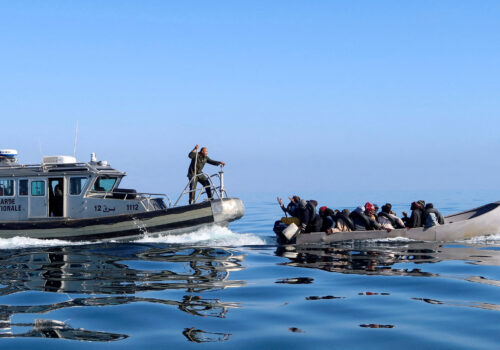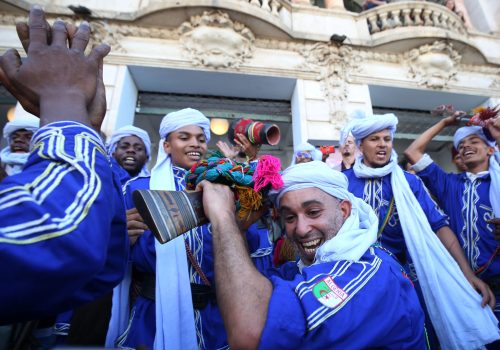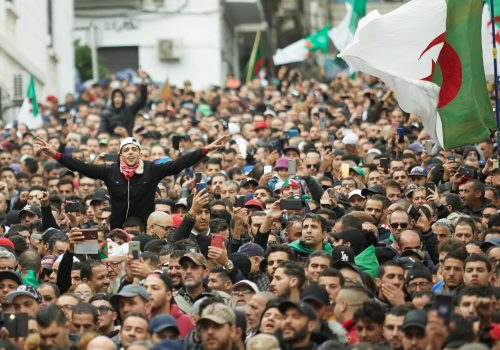Algeria has never seen a smooth transfer of power. It won’t in this election, either.
Algeria will hold a presidential election on September 7, in which incumbent President Abdelmadjid Tebboune will face off against two weak challengers.
Tebboune was first elected in a controversial 2019 poll organized against the backdrop of the Hirak, a mass popular uprising demanding new leadership. The call for transition was a direct challenge to the country’s reigning political order—the shadowy cabal of military and political elites that Algerians refer to as “le pouvoir” (the power).
Five years later, those popular demands for new leadership have been addressed only superficially. Le pouvoir is still in place.
Nonetheless, next month, Tebboune is all but certain to win reelection to a second five-year term, disappointing the many Algerians who long for fresh faces and fresh thinking in the country’s leadership.
Broken handovers
In its sixty-two-year modern history, Algeria has never witnessed a smooth transfer of power from one president to another.
The country’s first post-independence president was deposed in a military coup after just three years in office. The coup leader, Houari Boumediene, ruled with an iron grip for more than a decade, entrenching a system of military rule with a thin civilian façade that has endured ever since. He would have reigned longer but for an obscure illness that claimed his life in 1978, sparking rumors of foul play.
SIGN UP FOR THIS WEEK IN THE MIDEAST NEWSLETTER
His successor, Chadli Bendjedid, elected in 1979, ruled until an oil price slump obliged the state to curtail social spending, provoking a crisis. His solution, a hasty political opening, nearly delivered the country to an extremist Islamist party. To prevent that outcome, the army seized power in 1992, triggering a civil war.
In search of a figurehead, the military tapped independence hero Mohamed Boudiaf—but soon regretted its choice when he launched ambitious anti-corruption and reform campaigns that threatened its interests. After just five months in office, Boudiaf was assassinated on live television by his own bodyguard—with signs pointing to the military’s involvement.
The army’s chosen replacement soon had his own falling out with the generals. So, too, did his successor, Liamine Zeroual, who resigned unexpectedly in 1998, complaining of undue influence from the military.
The following year, the army’s hand-picked candidate, former Foreign Minister Abdelaziz Bouteflika, won an election intended to turn the page on Algeria’s “dark decade.” He was reelected three times and, despite being incapacitated by poor health, remained le pouvoir’s default pick in 2019.
The imposition of an infirm and invisible president for a fifth term struck a chord of indignity for many Algerians. Just days after Bouteflika’s candidacy was announced, peaceful mass protests erupted nationwide.
Following five weeks of sustained demonstrations, the military signaled that it no longer backed the president. Two days later, on April 2, 2019, Bouteflika resigned. Arrests of many of his cronies soon followed.
The Hirak had coalesced around a blanket call for transition—the slogan “Yetnehaw gaa” (“Get them all out”). But here, it fractured. Some had sought new leaders rather than new institutions. The ouster of the sitting president and his corrupt entourage was enough for them. It also marked a symbolic passing of the torch from the long-ruling independence generation.
But other protesters sought a more fundamental reset of Algeria’s political system: an inclusive national transition process, a new constitution, and clearing of the political deck. Some even dared to demand an end to the long tradition of de facto military rule, which had seen every one of Algeria’s post-independence leaders drawn from the ranks of liberation heroes while the army lurked behind every president, steering decisions to maintain its authority.
After Bouteflika resigned, those military leaders rejected protesters’ calls for fundamental change and instead rushed to elections.
Tebboune, a former regional governor, housing minister, and failed prime minister—who holds the distinction of being Algeria’s shortest-serving premier, lasting less than three months in 2017—emerged as the army’s anointed pick in the controversial polls, which protesters boycotted. He was elected amid record-low turnout.
“The new Algeria”
During his five years as president, Tebboune has built a checkered legacy.
Just months after his inauguration, the COVID-19 pandemic ravaged the country’s healthcare system. Meanwhile, Tebboune fled to Germany for treatment when he contracted the virus.
The Ukraine war saved his fortunes. As Europe scrambled to secure alternatives to Russian energy, demand for Algerian oil and gas soared. European leaders flocked to Algiers to sign new energy deals, bringing an influx of cash.
Tebboune used this windfall to buy support and compensate for his limited electoral legitimacy. He more than doubled the military’s budget (from $10 billion in 2022 to nearly $22 billion today), expanded social spending, and shelved planned subsidy cuts. But he struggled to rein in inflation and failed to meet his own export growth targets.
At the same time, he clamped down on public freedoms to smother the Hirak and prevent its return. He snuffed out the last protests, amended the penal code to make it easier to arrest dissidents on political charges, imprisoned journalists, shuttered unfavorable media outlets, and dissolved the country’s leading human rights organizations. He also passed a new constitution that further reinforced presidential powers.
These measures deepened a long-standing dichotomy. Today, those content to keep their heads down and mouths shut, and to accept some limited role in the state-dominated economy, stick around and do as they’re told. Meanwhile, more ambitious, free-thinking Algerians chafe at the restraints, with many ultimately fleeing abroad or landing behind bars.
On foreign policy, Tebboune failed to leverage Algeria’s newfound popularity to advance key foreign policy priorities—gaining admittance to the BRICS (Brazil, Russia, India, China, and South Africa) coalition in 2023, protecting the Palestinians from Israeli aggression, defending Western Sahara’s right to self-determination, or maintaining Algeria’s sphere of influence in the Sahel.
The election
Tebboune’s record offers plenty of reasons why Algerians might want to vote him out of office. But this election offers little hope for a transition of power.
Every national institution of consequence has been coopted and pressed into service as an arm of Tebboune’s campaign, including the former ruling National Liberation Front and its allied parties; national organizations of women and veterans; and national councils of youth and civil society established by Tebboune.
Anyone who could threaten Tebboune’s reelection chances has already been sidelined. Former Foreign Minister Ramtane Lamamra was pushed into a United Nations envoy post abroad, General Ali Ghediri’s bogus prison sentence was extended, leftist firebrand Karim Tabbou is confined to his neighborhood and barred from politics, former candidate Rachid Nekkaz fled to the United States, and journalist Ihsane El Kadi languishes in prison. Others announced early retirements from politics to avoid similar fates. Algeria’s leading Islamist party, the Movement of a Society of Peace (MSP), blocked its outgoing president, Abderrezak Makri, from running in what appeared to be an orchestrated deal with le pouvoir.
Despite the risks, more than thirty candidates hoped to challenge Tebboune. Ultimately, authorities approved only two, while pursuing fraud charges against several others over their candidate paperwork.
The two approved contenders—Abdelaali Hassani Cherif, the Islamist who succeeded Makri as MSP president last year, and Youcef Aouchiche, the young leader of the Socialist Forces Front (FFS)—each have a solid campaign machine but will struggle to attract support beyond their limited electoral bases. Tebboune is an old bureaucrat in a young country, but handouts and the trappings of office have enabled him to rally a sizable core of supporters.
In sum, Tebboune is nearly certain to win an overwhelming majority on the first vote, eliminating the need for a second round.
Confident of victory, his campaign is concentrated on boosting participation beyond the 39.9 percent officially reported in 2019, having seen how that limited participation has sapped his legitimacy.
There is little reason to believe Tebboune will make dramatic gains on that score. The dissatisfaction with the ruling elite and their refusal to share power that pushed Algerians into the streets in 2019 remain largely unaddressed. A weak slate of alternative candidates and the near certainty of Tebboune’s victory will also do little to inspire participation. Algerians aren’t likely to see their first normal handover of power in 2024—le pouvoir won’t let them.
Andrew G. Farrand is a nonresident senior fellow with the Atlantic Council’s Middle East Programs and author of The Algerian Dream.
Further reading
Tue, Jun 25, 2024
A world in crisis is good news for North Africa’s political elites
MENASource By Alia Brahimi, Karim Mezran
Europe should not assume that increasing transactional dealings with these elites will produce stability on its southern frontier.
Wed, Jun 29, 2022
Algeria has been isolated for years. Now it’s making a shaky return to the world stage.
MENASource By
On both the substance and presentation of its foreign relations, if it is to seize this moment, Algeria has much catching up to do.
Tue, Dec 17, 2019
Algerian election and legitimacy: Impossibility of change
MENASource By
The Algerian election lacks legitimacy and the military and political elite are using elections to foster an image of legitimacy which doesn't exist.
Image: People walk past election posters ahead of the presidential election in Algiers, Algeria, on August 25, 2024. (Photo by Billel Bensalem / APP) (Photo by APP/NurPhoto)NO USE FRANCE


